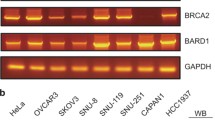We analyzed associations of polymorphic markers of DNA repair genes (XRCC1, ERCC2), cell cycle control genes (TP53, MDM2, and CDKN1A), methylation of promoter region, and mutation 5382insC of BRCA1 gene in ovarian cancer with effectiveness of platinumbased chemotherapy assessed by the median of progression-free survival time for markers of DNA repair genes and by relapse risk for all studied markers. An increase in the median of progression-free survival time for carriers of the Gln allele (р=0.025) and Gln/Gln genotype (р=0.022) of the Gln399Arg XRCC1 was observed during the 19-months period after chemotherapy. In carriers of C/C genotype of 5382insC mutation of BRCA1 gene (n=6), no relapses were observed (р=0.035), while 17 of 49 patients without this mutation developed relapses. Of 14 patients with BRCA1 gene function inactivation due to promoter methylation or the presence of the C/C genotype of 5382insC, one relapse was observed (p=0.033). Multivariate analysis revealed an association of markers of the XRCC1, TP53, MDM2 genes, BRCA1 gene inactivation, and type of surgery with the risk of relapse during the follow-up period up to 19 months after the end of chemotherapy (р≤0.0007).
Similar content being viewed by others
References
Zavarykina TM, Tyulyandina AS, Khokhlova SV, Khabas GN, Asaturova AV, Nosova YA, Brenner PK, Kapralova MA, Atkarskaya MV, Khodyrev DS, Burdennyi AM, Loginov VI, Stenina MB, Sukhikh GT. Association of Molecular Genetic Markers of TP53, MDM2, and CDKN1A Genes with Progression-Free Survival of Patients with Ovarian Cancer after Platinum-Based Chemotherapy. Bull. Exp. Biol. Med. 2020;169(4):486-490. https://doi.org/10.1007/s10517-020-04915-5
Tyulyandin SA, Kolomiets LA, Morkhov KYu, Nechushkina VM, Pokataev IA, Rumyantsev AA, Tyulyandina AS, Urmancheeva AF, Khokhlova SV. Practical recommendations for drug treatment of ovarian cancer, primary cancer of the peritoneum and cancer of the fallopian tubes. Zlokachestvennye Opukholi. 2019;9(3S2):164-176. https://doi.org/10.18027/2224-5057-2019-9-3s2-164-176. Russian.
Cannistra SA. Cancer of the ovary. N. Engl. J. Med. 1993;329(21):1550-1559. https://doi.org/10.1056/NEJM199311183292108
Hofstetter G, Berger A, Bauer M, Schuster E, Wolf A, Chamson M, Müller-Holzner E, Reimer D, Braicu EI, Sehouli J, Ulmer H, Cacsire Castillo-Tong D, Zeillinger R, Concin N. MDM2 SNP309 modifies the prognostic significance of the p53 mutational status in patients with ovarian cancer. Oncol. Rep. 2012;27(3):673-677. https://doi.org/10.3892/or.2011.1560
Kim SI, Lee M, Kim HS, Chung HH, Kim JW, Park NH, Song YS. Effect of BRCA mutational status on survival outcome in advanced-stage high-grade serous ovarian cancer. J. Ovarian Res. 2019;12(1):40. https://doi.org/10.1186/s13048-019-0511-7
Makii C, Oda K, Ikeda Y, Sone K, Hasegawa K, Uehara Y, Nishijima A, Asada K, Koso T, Fukuda T, Inaba K, Oki S, Machino H, Kojima M, Kashiyama T, Mori-Uchino M, Arimoto T, Wada-Hiraike O, Kawana K, Yano T, Fujiwara K, Aburatani H, Osuga Y, Fujii T. MDM2 is a potential therapeutic target and prognostic factor for ovarian clear cell carcinomas with wild type TP53. Oncotarget. 2016;7(46):75328-75338. https://doi.org/10.18632/oncotarget.12175
Patch AM, Christie EL, Etemadmoghadam D, Garsed DW, George J, Fereday S, Nones K, Cowin P, Alsop K, Bailey PJ, Kassahn KS, Newell F, Quinn MC, Kazakoff S, Quek K, Wilhelm-Benartzi C, Curry E, Leong HS; Australian Ovarian Cancer Study Group, Hamilton A, Mileshkin L, Au-Yeung G, Kennedy C, Hung J, Chiew YE, Harnett P, Friedlander M, Quinn M, Pyman J, Cordner S, O’Brien P, Leditschke J, Young G, Strachan K, Waring P, Azar W, Mitchell C, Traficante N, Hendley J, Thorne H, Shackleton M, Miller DK, Arnau GM, Tothill RW, Holloway TP, Semple T, Harliwong I, Nourse C, Nourbakhsh E, Manning S, Idrisoglu S, Bruxner TJ, Christ AN, Poudel B, Holmes O, Anderson M, Leonard C, Lonie A, Hall N, Wood S, Taylor DF, Xu Q, Fink JL, Waddell N, Drapkin R, Stronach E, Gabra H, Brown R, Jewell A, Nagaraj SH, Markham E, Wilson PJ, Ellul J, McNally O, Doyle MA, Vedururu R, Stewart C, Lengyel E, Pearson JV, Waddell N, deFazio A, Grimmond SM, Bowtell DD. Wholegenome characterization of chemoresistant ovarian cancer. Nature. 2015;521:489-494. https://doi.org/10.1038/nature14410
Rodríguez-Vicente AE, Lumbreras E, Hernández JM, Martín M, Calles A, Otín CL, Algarra SM, Páez D, Taron M. Pharmacogenetics and pharmacogenomics as tools in cancer therapy. Drug Metab. Pers. Ther. 2016;31(1):25-34. https://doi.org/10.1515/dmpt-2015-0042
Sørensen BH, Nielsen D, Thorsteinsdottir UA, Hoffmann EK, Lambert IH. Downregulation of LRRC8A protects human ovarian and alveolar carcinoma cells against Cisplatin-induced expression of p53, MDM2, p21Waf1/Cip1, and Caspase-9/-3 activation. Am. J. Physiol. Cell Physiol. 2016;310(11):C857-C873. https://doi.org/10.1152/ajpcell.00256.2015
Tomao F, Bardhi E, Di Pinto A, Sassu CM, Biagioli E, Petrella MC, Palaia I, Muzii L, Colombo N, Panici PB. Parp inhibitors as maintenance treatment in platinum sensitive recurrent ovarian cancer: An updated meta-analysis of randomized clinical trials according to BRCA mutational status. Cancer Treat. Rev. 2019;80:101909. https://doi.org/10.1016/j.ctrv.2019.101909
Author information
Authors and Affiliations
Corresponding author
Additional information
Translated from Byulleten’ Eksperimental’noi Biologii i Meditsiny, Vol. 171, No. 6, pp. 745-750, June, 2021
Rights and permissions
About this article
Cite this article
Zavarikina, T.M., Khokhlova, S.V., Tyulyandina, A.S. et al. Association between Molecular Genetic Markers of DNA Repair and Cell Cycle Control Genes and Response to Platinum-Based Chemotherapy in Ovarian Cancer Patients. Bull Exp Biol Med 171, 755–759 (2021). https://doi.org/10.1007/s10517-021-05310-4
Received:
Published:
Issue Date:
DOI: https://doi.org/10.1007/s10517-021-05310-4




